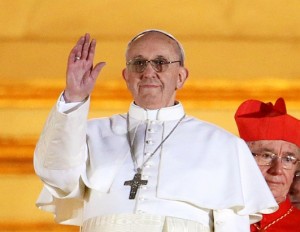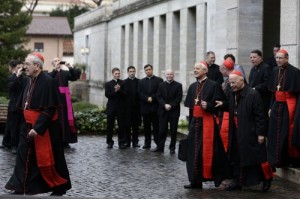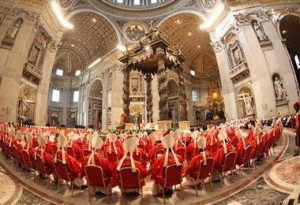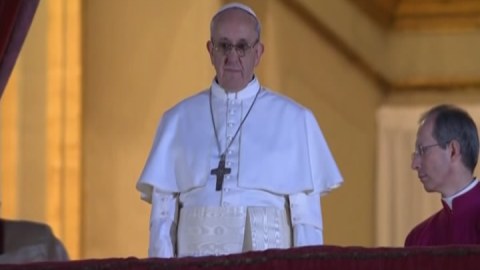A corrupt and decrepit religious institution has elected another septuagenarian, Cardinal Jorge Mario Bergoglio, 76. He’s from Argentina and a Jesuit no less. Perhaps he will focus attention on the poor of the world, and the people of Latin America, but that would be an unintended consequence.
 The real purpose is to staunch the bleeding from the Church of believers in the region where nearly half of the world’s 1.2 billion nominal Catholics reside. Indeed, a third of Catholics even in North America are Hispanic. The men in red felt they needed to act fast.
The real purpose is to staunch the bleeding from the Church of believers in the region where nearly half of the world’s 1.2 billion nominal Catholics reside. Indeed, a third of Catholics even in North America are Hispanic. The men in red felt they needed to act fast.
The new pope has taken the name of Francis, but in true Jesuitical fashion, no one knows whether his namesake is St. Francis of Assisi, a simple monk with a great affinity for nature and animals; or, more likely, St. Francis Xavier, as student of Ignatius of Loyola, the founder of the Jesuits, and a big evangelizer.
The word ‘jesuitical’ has come to mean “one given to intrigue or equivocation.” Jesuits are the smart cookies of the Catholic Church, priests who make the cleverest lawyers look like simple schoolchildren.
We already have gotten taste of the image and the creation of a media persona for Pope Francis. Cardinal Bergoglio is “such a simple guy,” according to young Argentinean followers, “a man of great humility and simplicity…a people’s pope,” according to fawning commentators.
But as a priest named Father Reese, one of the few truthful commentators on a day of hollow exuberance stated: “The Church in Latin America is in trouble.” Incisively, he added, “The election of Pope Francis is a vote for continuity not for change.”
Even more likely it’s an attempt by the Cardinals to have things both ways. “People in the papacy like to wear silk,” and in his opening ceremony Pope Francis has already signaled that he intends to un-guild the image of lavishness and wealth of the Church. Why, he even takes public transportation, and sometimes prepares his own meals!
Cardinal Bergoglio wrote a book entitled, “John Paul II: Prophetic Politician.” That means the 266th leader of a 2000-year-old organization, encrusted with tradition and having nothing to do with true religiosity, is trying to recapture the  political relevance of the last charismatic pope.
political relevance of the last charismatic pope.
The men in red have picked an old, conservative leader who will remain dedicated to the Catholic Church’s hidebound doctrines, and people with any inner life at all will not take this news seriously. It simply doesn’t matter for the spiritual life of nominal Catholics, much less the spiritual life of people of all faiths who have a passionate urge to adequately respond to the human crisis.
For an unpleasant few months last fall, ‘Meditations’ came under attack by a learned Catholic, Italian-American professor in Florida, with the complicity of his Greek editor, at a site in Helsinki where ‘Meditations’ appeared. It’s a maul world after all.
The learned professor, a dyed-in-the-wool defender of the Roman Catholic Church, was fond of citing chapter and verse of Catholic theology, and putting down proposed contemplative insights in my column by saying ad nauseum that I was “reinventing the wheel.” Indeed, when I looked at the site for the first time in months, he was still hacking at his straw man, with “Lest We Reinvent the Wheel” in a title.
The underlying idea of this rather fascistic fellow, who imagines himself a philosopher and puts on a patina of progressivism, while at the same time repeating the same religious and philosophical rot over and over, is that there is no insight anyone can have that has not already been had to a much greater degree by theologians and philosophers in  the past.
the past.
Of course the real intention was to shut up anyone who dares to challenge his academic knowledge and the received wisdom of centuries of Catholic theology. He became apoplectic after I wrote a piece saying that the Catholic Church was irrelevant, and organized religion had no place in the spiritual advancement of humankind.
But religious authority is completely inimical to religious experiencing. That’s one of the greatest contradictions and ironies of human history, since awareness of the numinous (God, for lack of a better word) is supposedly the raison d’etre of religions.
In any case, the human prospect is now in the hands of individuals who must think together, not corrupt and decrepit institutions, whether organized religions or governments, or both as in the case of the Vatican.
Spiritual insight doesn’t flow from beliefs and traditions, but rather from dissolving every day psychological knowledge and religious experience. That is, insight comes with emptying, and grows without accretion in the emptiness of being. Understanding is never becoming; it is now, or it isn’t. Insight deepens understanding, but never additively.
In this sense one does indeed ‘reinvent the wheel’ every day, because there is only being and beginning perennially. Accumulation, whether in the individual or so-called religious institutions, is the way of decay.
Martin LeFevre

